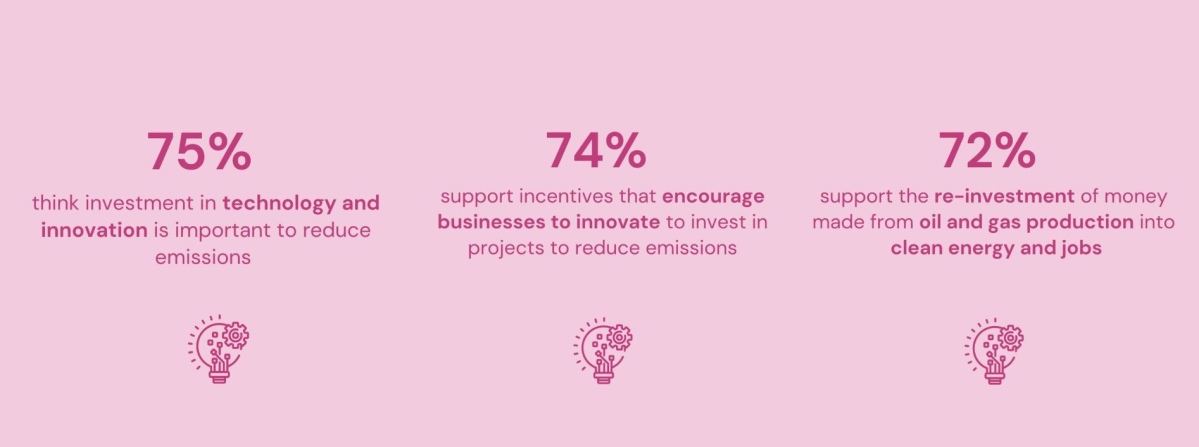Photo: Susan Downie-Gagnon, founder of CONSTRATA.
When discussing the importance of economic prosperity, the need for energy security and the future of environmental sustainability it doesn’t take long for the conversation to transform into an either/or debate.
But these topics don’t exist on opposite ends of the table — in fact, when it comes to navigating policy discussions and what’s important to engaged women and many Canadians — all three intersect.
When we asked engaged women across Canada about their priorities, they told us: all of the above.
Despite the differences in regional energy resources across the country, Canadian women find common ground with the importance of a successful, affordable Canadian economy (85 per cent), energy security — reliability and affordability (84 per cent) — and climate change via reducing global emissions (80 per cent).
“It’s about finding that balance between all of them,” says Tamara Ritzel, an engaged women from Calgary, Alberta who built her career in the energy industry before launching her own business in 2024. “A big part of the conversation is being realistic, from both an environmental and emissions perspective, which naturally connects to the economy and energy security.
“Taking a collaborative, balanced approach and being very intentional and deliberate with the way things are communicated is important,” she adds.

Tamara Ritzel, chief connection officer at Bridging the Connection Gap.
Vancouver-based Susan Downie-Gagnon, the founder of CONSTRATA, shares this sentiment. “I firmly believe a strong economy can, and should, enable advancements in sustainability and energy security. The key lies in thoughtful, proactive decision-making that fosters progress across these interconnected areas,” she says.
“When managed responsibly, these resources can not only ensure energy security but also support economic health for Canadians. I believe that, if done well, this can support prosperity and equity, as well as environmental sustainability.”
Reducing global emissions through technology and innovation
Our spring 2024 research shows that engaged women see a mix of energy sources as important to shaping Canada’s economic future, and when it comes to emissions reduction:
- 75 per cent of engaged women support investment in technology and innovation
- 74 per cent support incentives for businesses to innovate to invest in projects
- 72 per cent support re-investing money made from oil and gas production into clean energy and jobs

“I know a lot of people talk about the energy transition, but I think it’s more about diversification and optimizing what we have available — using wind and solar when it makes sense, while still remaining prepared for changes in our weather patterns and conditions,” says Ritzel.
Canada is currently a world leader when it comes to reducing emissions and diversifying the energy mix through technology and innovation. Our country ranked second on the Global Cleantech 100 in 2024, which provides a comprehensive list of the top 100 companies leading sustainable innovation around the globe each year, where 13 Canadian companies made the leaderboard.
According to Invest in Canada, a foreign direct investment attraction and promotion agency, Canada is also the third-largest producer of hydroelectricity and home to 20 per cent of the world’s large-scale carbon capture, utilization and storage projects.
“I believe we are incredibly fortunate to live in a vast land rich in natural resources that can provide us — and our friends and neighbours — with energy security,” says Downie-Gagnon. “For decades, and continuing to this day, there have been significant advancements in how we extract and utilize these resources. This strength is something we must continue to innovate and develop.”
Engaged women, the environment and everyday life
For many engaged women, environmental sustainability is not only a national priority, but an everyday consideration. Along with a balanced approach to their three key priorities at a policy level, engaged women make conscious decisions and adaptations to benefit the environment at a personal level.
“The environment is very important to me,” says Ritzel. “I’m a nature lover, and I know how important it is to be respectful of our outdoors. I live and work downtown, so I walk everywhere as much as possible and only drive when absolutely necessary.”
She also reduces food waste through intentional purchasing, preparation and storage, is mindful of her water consumption and recycles wherever possible.
“In my professional life, I’m deeply committed to advancing sustainability in the context of energy security and economic well-being,” adds Downie-Gagnon, whose work at CONSTRATA involves collaborating with organizations who share similar values to take a multi-faceted approach to solving the complex challenges in the natural resources sector. “On a personal level, I’ve been looking at consumption as well as our quickly changing culture, and how this affects individuals as well as the collective worldwide.
“I draw inspiration from younger generations who are championing the circular economy, embracing practices like thrifting and actively reducing waste. I’ve had the privilege of working with many bright, driven individuals at the beginning of their careers who are dedicated to building a more sustainable future. Their enthusiasm continues to motivate and inform my approach to environmental stewardship.”
This approach includes using products for the entirety of their lifespan — i.e., replacing electronics once they stop working, rather than as soon as new version becomes available, purchasing quality items to ensure a longer lifespan and opting to repair them wherever possible, rather than replace. Downie-Gagnon also focuses on buying local products wherever she can, as opposed to ordering things online, in an effort to reduce her carbon footprint.
Building a prosperous, secure and sustainable future for Canada
Canada Powered by Women’s research clearly reflects that the priorities of engaged women are interconnected and equally achievable through a balanced, mindful approach that leverages our country’s vast natural resources, responsible management and ongoing advancements in technology and innovation.
By embracing a diversified energy mix, investing in sustainable technologies and implementing mindful practices both personally and collectively, engaged women believe a prosperous, secure and sustainable future is attainable for Canada and generations to come.
